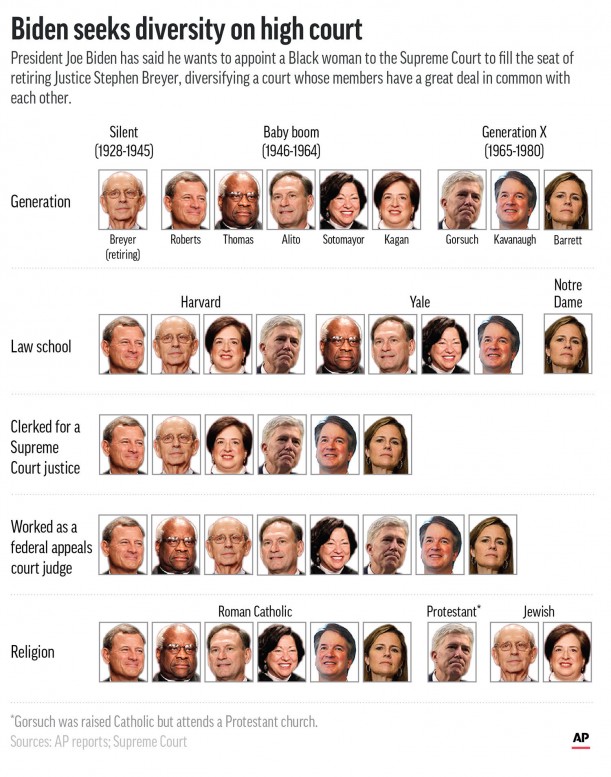Supreme Court Shouldn’t Be Covered in Ivy, 2 Lawmakers Say

Enough already with the Supreme Court justices with Harvard and Yale degrees. That’s the message from one of Congress’ top Democrats to President Joe Biden, and a prominent Republican senator agrees.
Eight of the nine members of the current court went to law school at either Harvard or Yale. But it would be good if the person named to replace retiring Justice Stephen Breyer doesn’t have an Ivy League degree, according to Rep. Jim Clyburn, a Democrat, and Sen. Lindsey Graham, a Republican. The bipartisan message from the two South Carolina lawmakers neatly aligns with the background of the South Carolina judge they’ve praised as a good candidate to fill the seat.
Biden, a Democrat, has pledged to make history by nominating the first Black woman to the Supreme Court. Clyburn, Congress’ highest-ranking Black member, says Biden should be concerned about the court’s lack of educational diversity, too.
“We run the risk of creating an elite society,” said Clyburn, who is a graduate of South Carolina State University. “We’ve got to recognize that people come from all walks of life, and we ought not dismiss anyone because of that.”
Graham, a member of the Judiciary Committee, which will hold hearings for the eventual nominee, said Sunday on CBS’ “Face the Nation” that he’d like to see the court “have a little more balance, some common sense on it. Everybody doesn’t have to be from Harvard and Yale. It’s OK to go to a public university and get your law degree.”
Clyburn is a particularly prominent voice in the debate over whom the nominee should be. At Biden’s lowest moment in the 2020 presidential campaign, it was Clyburn who suggested he pledge to name the first Black woman justice if given the opportunity as president. Biden’s ultimate promise and Clyburn’s endorsement helped Biden decisively win South Carolina’s primary. The win revived his campaign and helped propel him to the White House.
Clyburn has made clear his own first choice for the open seat: J. Michelle Childs. The 55-year-old federal judge got her law degree from the University of South Carolina School of Law. She also has a master’s degree from the university and another degree in law from Duke. Other women frequently talked about as possible nominees are Ivy League graduates. Leondra Kruger, a justice on the California Supreme Court, graduated from Yale’s law school. Ketanji Brown Jackson, a federal appeals court judge, went to Harvard.
Lawrence Baum, a professor emeritus at Ohio State who has studied the backgrounds of Supreme Court justices, said there’s been a gradual shift to nominees with more elite law school backgrounds.
The fact that a nominee has attended a school “regarded as the best, or at least among the best,” might sway senators at the margins, Baum said. But going to a prestigious school can also connect a person with others who go on to politically important positions, he said, making them known in elite legal circles.
Judith Browne Dianis, the executive director of the Advancement Project, a racial justice organization, said the current nomination is “an opportunity for the legal profession to have more discussions about the term ‘qualified.’“ Dianis said the qualifications that have been used in the past are “based on a career pathway that has been reserved for white men traditionally and some white women.” There are “very few people of color and Black people who have that pathway because there is a lot of discrimination that happens along the way,” she said.
While the overwhelming dominance of Harvard and Yale law degrees on the court is something of a modern phenomenon, about a third of all the justices who have sat on the court attended an Ivy League law school.
Sen. Richard Blumenthal, who went to Harvard as an undergraduate and Yale law school, said that the schools provide a good education and attract top talent, but he said that diversity of educational background can also benefit the judiciary. “I think, not that the top tier law schools are overrated, but they shouldn’t be the sole source, of members of the bench,” he said.
Education isn’t the only way in which the backgrounds of the current justices are similar. All but one of the current justices is a former federal appeals court judge. And six served as a law clerk to a justice, a highly coveted position that often sets young lawyers on the path to other high-profile posts.
Currently, the court is split 4-4 between Harvard and Yale law graduates.
Breyer attended Harvard, as did Chief Justice John Roberts and Justices Elena Kagan and Neil Gorsuch. Sotomayor and Justices Clarence Thomas, Samuel Alito and Brett Kavanaugh attended Yale. The court’s newest member, Justice Amy Coney Barrett, is the outlier. Barrett is a graduate of Notre Dame’s law school.
User login
Omaha Daily Record
The Daily Record
222 South 72nd Street, Suite 302
Omaha, Nebraska
68114
United States
Tele (402) 345-1303
Fax (402) 345-2351




